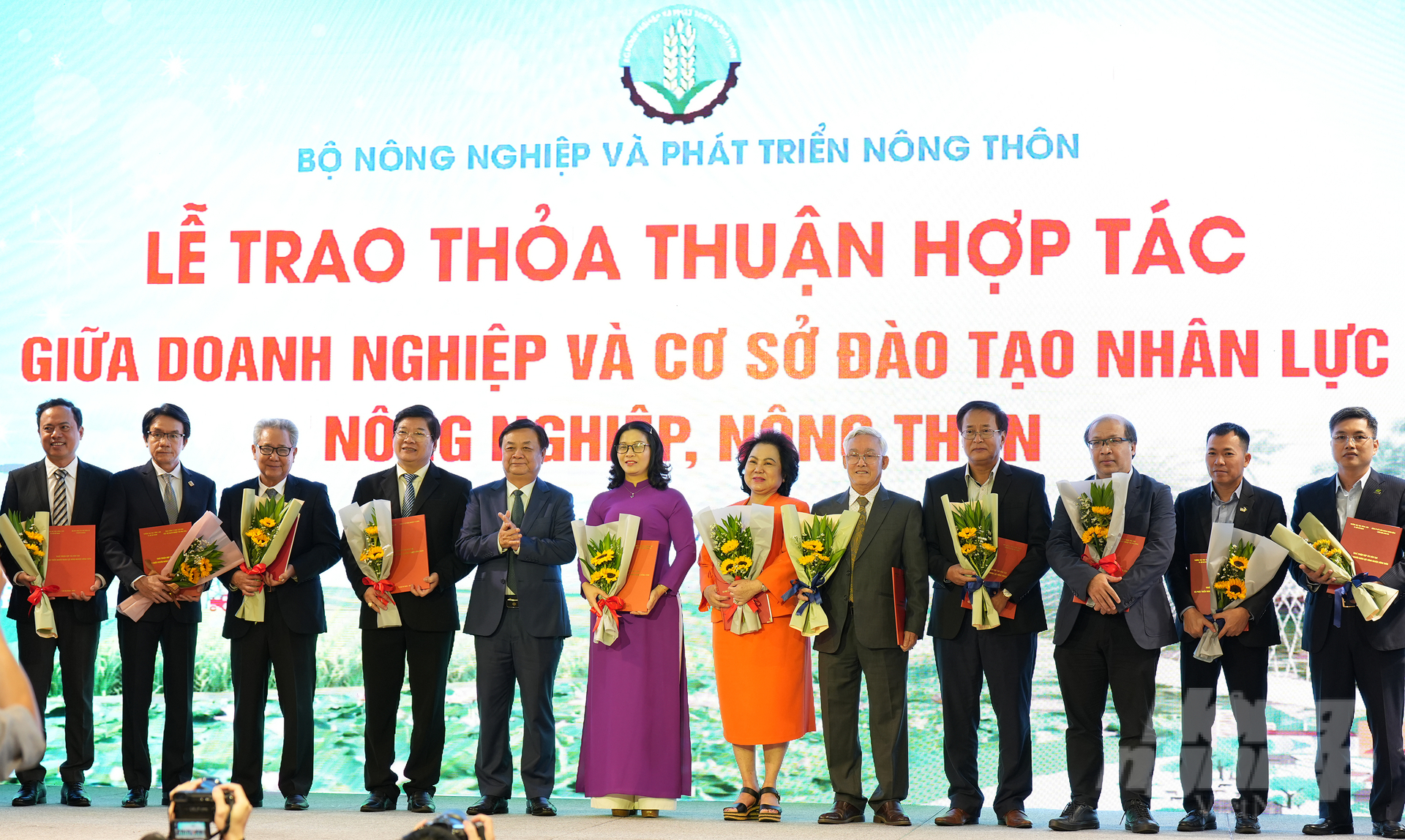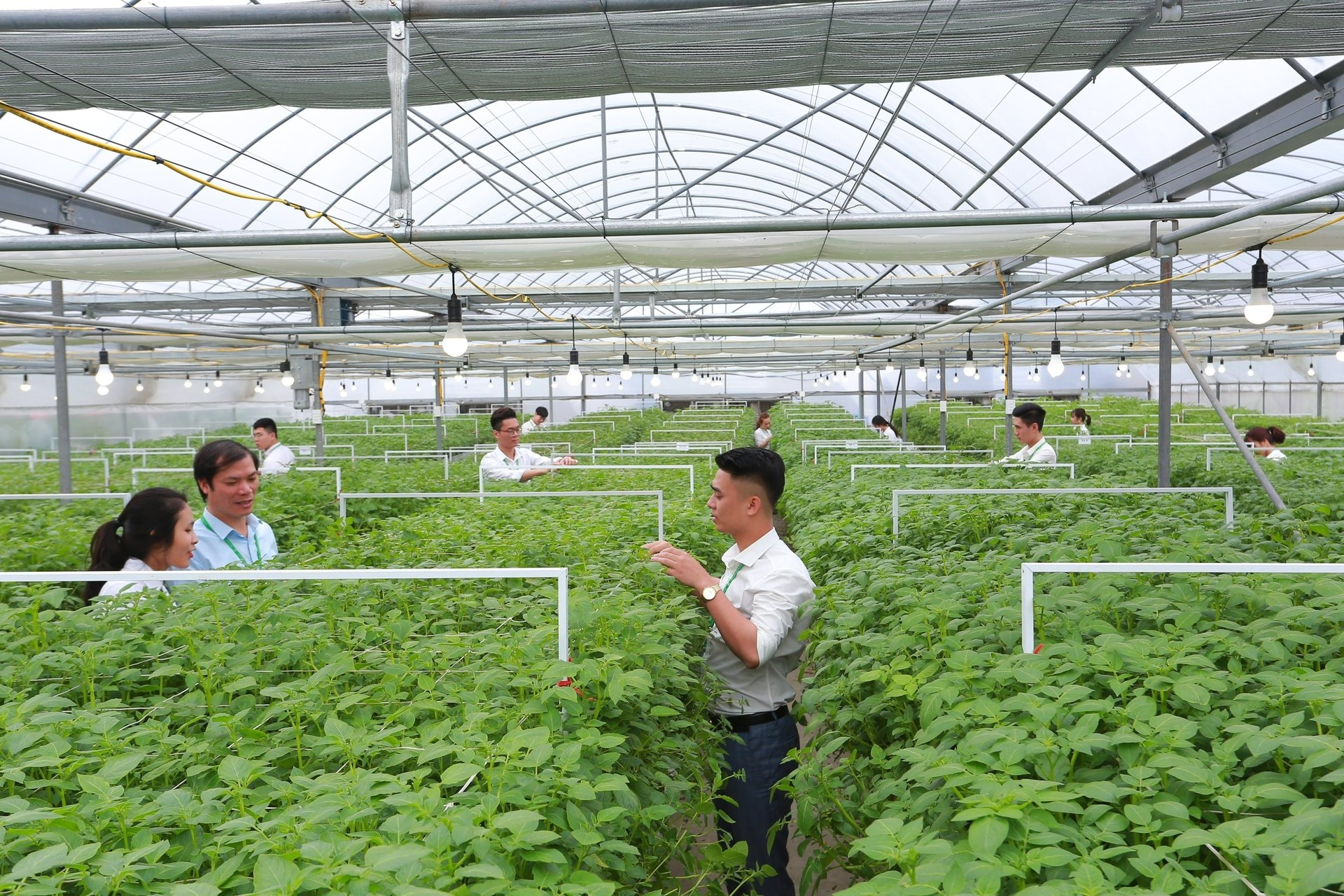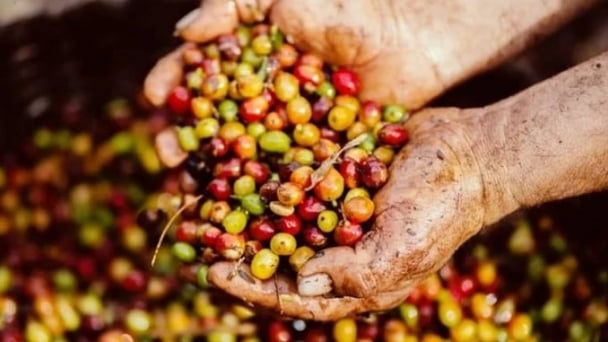June 17, 2025 | 15:50 GMT +7
June 17, 2025 | 15:50 GMT +7
Hotline: 0913.378.918
June 17, 2025 | 15:50 GMT +7
Hotline: 0913.378.918

Vietnam National University of Agriculture has made an agreement to partner with businesses and groups to provide training on agricultural and rural human resources. Photo: Phuc Lap.
Sharing at the Conference " Training and Developing Human Resources for Sustainable Agriculture and Rural Development in the Southern Provinces " chaired by Minister Le Minh Hoan in Ho Chi Minh City on August 4, Prof. Dr. Nguyen Thi Lan, Secretary of the Party Committee, Director of the Vietnam National University of Agriculture stated, this is an opportunity for training institutions to discuss and be open to ideas from businesses and employers to overcome difficulties, as well as build and refine the quality of training programs to meet the requirements of the professional world.
As emphasized by Prof. Dr. Nguyen Thi Lan, in the realm of agriculture and rural development, the assurance of high-quality human resources is pivotal to achieving triumph in the process of agricultural restructuring, closely intertwined with the establishment of new rural areas.
"In the long term, meeting the requirements of the domestic and international labor market will pave the way to building and developing high-tech agriculture with great added value.
This will be a team of scientific, technical, and economic managers working directly in rural, mountainous, border, and island areas; regions located in the priority areas for the socio-economic development of the Party and State, so they are also the core force in building new rural areas," said Prof. Lan.
In light of this, Prof. Lan expressed the need for program innovation and strategic partnerships with businesses to elevate the standards of education. It has become imperative to empower graduates to meet the expectations of employers and seamlessly integrate into the workforce, thereby preventing societal resource misallocation.
"The Vietnam National University of Agriculture has been renovating the training program, linking theoretical training with practical practice at enterprises in order to respond to the rapid changes in the real world," Prof. Lan informed.
For consecutive academic years, starting from 2017-2018, the Vietnam National University of Agriculture has been engaging in fruitful partnerships, facilitating internships for nearly 6,000 students across a wide array of more than 200 businesses and over 50 research institutes, hoping to enhance their vocational expertise and competencies.
Through various internship programs, students have been provided with opportunities to reinforce and apply their specialized knowledge, gaining a comprehensive understanding of production scales and current conditions. Engaging in specific activities at the internship sites, students have undertaken technical tasks related to their respective fields of study, resulting in an elevation of their specialized expertise. As a result of these internships, they have learned to apply theoretical knowledge acquired in classrooms to investigate, explain, and research issues within their disciplines, further solidifying their vocational competence and specialized knowledge. Additionally, they have acquired skills in collecting secondary data and conducting primary data surveys. Utilizing research methodologies in practical settings, they have demonstrated proficiency in data handling, analysis, and report writing, etc.

Students of Vietnam National University of Agriculture during their internships at businesses
"Cooperation between universities and businesses is an inevitable trend and brings long-term value to the parties. The cooperation with the business sector will contribute to strengthening the capacity of the staff and learners through collaborative research and product development activities," said Professor Lan.
In addition, the University took an active approach by commissioning research and developing products through regular exploration of business needs. Utilizing this information, the institution initiated research projects and facilitated the transfer of technology to enterprises. Furthermore, in collaboration with businesses, they also organized scientific and technological fairs, effectively promoting products to both businesses and consumers.
In the domain of commercializing scientific and technological innovations, the University has directed its efforts towards fostering Spin-off technology startups in diverse fields encompassing pharmaceuticals, cosmetics, biotechnology, veterinary biologics, electro-mechanics, and food technology.
Regarding the fostering of entrepreneurship, the institution has forged partnerships with businesses to conduct agricultural startup competitions for students, with the ultimate goal of elevating awareness levels among both educators and learners…
The Vietnam National University of Agriculture holds a prestigious position as a multifaceted and nationally recognized institution, providing comprehensive education in various domains, including High-tech Agriculture, Veterinary husbandry, Electro-mechanics, Control and Automation Engineering, Food technology and business, Logistics and Supply chain management, E-commerce, and Agricultural business…
Within the framework of the Conference, the Vietnam National University of Agriculture has agreed to cooperate in training agricultural and rural human resources with Loc Troi Group; Food and Foodstuff Association of Ho Chi Minh City; Trung An High-Tech Agriculture JSC.; VinaControl Group JSC.
Translated by Nguyen Hai Long
![Turning wind and rain into action: [5] Hue applies modern technology in disaster forecasting](https://t.ex-cdn.com/nongnghiepmoitruong.vn/608w/files/news/2025/06/17/z6704423696987_15fd32ffc26d590d204d520c9dac6786-nongnghiep-093938.jpg)
(VAN) In Hue city, modern technology has recently been applied in meteorological and hydrological forecasting and warning, helping to reduce the damage caused by natural disasters.

(VAN) A cutting-edge farming technique being implemented on an experimental ranch in Arizona's Sonoran Desert has already saved a billion gallons of water over five years, according to Civil Eats.

(VAN) Poultry and pig production and the environment can be boosted through enhanced water technology, according to new research.

(VAN) Coffee prices on June 16, 2025 are unchanged. In Vietnam, local trading prices are holding steady, ranging around VND 112,000 – VND 112,500/kg.
![Turning wind and rain into action: [4] Bringing climate bulletins to remote and isolated areas](https://t.ex-cdn.com/nongnghiepmoitruong.vn/608w/files/linhnhp/2025/06/14/1152-z6704423696987_15fd32ffc26d590d204d520c9dac6786-nongnghiep-151141.jpg)
(VAN) The Vietnam Agriculture and Nature Newspaper interviewed Mr. Vu Thai Truong, Acting Head of Climate Change and Environment at UNDP Vietnam, to gain deeper insight into how climate bulletins are delivered to farmers.

(VAN) In Tien Giang, a high-tech shrimp farm has developed a distinctive energy-saving farming model that has yielded promising results.
![Turning wind and rain into action: [3] 300.000 farmers benefit from agro-climatic bulletins](https://t.ex-cdn.com/nongnghiepmoitruong.vn/608w/files/news/2025/06/12/e5a48259d6a262fc3bb3-nongnghiep-125122.jpg)
(VAN) The agro-climatic bulletin has become a valuable tool for farmers in the Mekong Delta. After more than five years of implementation, the initiative is gradually being expanded nationwide.